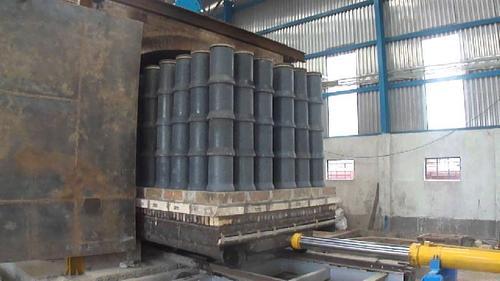TUNNEL KILN (Coal-based DRI Plant)
GROWMECH Tunnel Kilns are new energy efficient technology - a car pushing type continuous kiln that consists of preheating, firing and cooling zones, suitable for large production of Sponge Iron. The tunnel kilns are capable of using soft ore, and work with iron ore fines comfortably.

Our tunnel kilns are extremely low on environmental pollution; they have uniform product quality and low production cost. The tunnel kilns have the ability to convert Haematite and Magnetite sponge iron, and also work well with coal fines and mill scale.
Operational Benefits of Tunnel Kiln
The tunnel kilns conserve energy by capturing heat at the cooling end and recalculating it to help pre-heat materials that are entering the device. The pre heating, low energy consumption, cooling process are done in the kiln with less energy consumption. Coal consumption is reduced to 45% per batch of production. The tunnel kilns provide temperature conformity, and lower the fuel consumption.
Design Features of GrowMech Tunnel Kilns
- Consistent, high volume production from units
- High levels of control giving top quality products
- Low energy usage and lower cost production
- Computer-controlled to make operation simple and reliable
- Low maintenance and minimal downtime
- Storage and handling systems for easy operation
- Flexibility when required for product variations
- Reduced internal air movement for a better firing environment
- Modular construction for assembly prior to shipment
- Space-saving concepts including multiple level installations
- Automated Robotic or Manual car movement to suit plant situation
- A number of different methods can be used to heat tunnel kilns.
Customer Benefits
- Low energy costs
- Low operating costs
- Reduced production time
- Reduced GHG emissions
- Improved combustion
- The fuel feeding can be critically controlled
- Reduction in effluent generation
- Reduction in GHG emission
- Reduction in other emissions